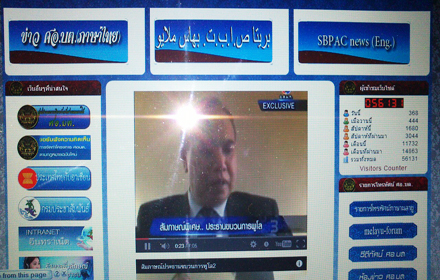Caution on peace initiative
The government’s peace initiative to open talks with all southern rebel groups has picked up momentum at a pace so fast that warnings of caution and slow down have been sounded.

The role of Kuala Lumpur as the "facilitator" for the time being and whatever capacities in the future has also been questioned by some critics for the fact that the term in office of the incumbent Malaysian government of Prime Minister Najib Razak is about to end in April and a general election is just around the corner with a projection that the conservative Opposition is likely to win most of the parliamentary seats in the northern states of Malaysia, namely Kelantan, Trenganoo, Perlis and Perak.
Prime Minister Yingluck Shinawatra was in Kuala Lumpur on February 28 with the government’s peace initiative as the top agenda for discussion with her Malaysian counterpart, Mr Najib, with Malaysia playing a role in the peace initiative.
One day earlier, a Thai delegation led by Lt-Gen Paradorn Pattanathabutr, secretary-general of the National Security Council, was in KL to meet with Hassan Taib, deputy secretary-general of an old rebel group, Barisan Revolusi Nasional or the BRN which has no control whatsoever on the new generation of rebels who have been terrorizing the region.
Taib came to public attention when he and several "old guard" rebels were reported to have hold talks with former prime minister Thaksin Shinawatra at a luxury hotel in KL in March 2012. The secret meeting did not make any headway after a car bomb attack at the Lee Garden hotel in Hat Yai and another car bomb explosion in Yala’s township on March 31.
Besides the BRN, several self-claimed and former leaders of another toothless rebel group, the Pattani United Liberation Organisation, appear eager to jump on the peace initiative bandwagon in order to carve out a role for themselves.
Kasturi Mahkota, the self-claimed president of PULO, came to public limelight when he appeared on TV Channel 3 last weekend to call for a special administration for the three southernmost provinces.
Three years ago in July, Kasturi announced unilateral ceasefire in Ra-nage, Yee Ngor and Cho Airong districts of Narathiwat for a month from June 10 to July 10 to demonstrate his group’s sincerity to sue for peace. His call was however shrugged off by Thai authorities who thought he was just an opportunist who wanted to carve a role in the peace process and has no clout whatsoever on the "juware" warriors.
Mr Panithan Wattanayakorn, a security expert, said that Malaysia was not in a position to provide much help because of its own limitations as it shares historical and cultural similarities with Thailand’s deep South. Also, the timing for Malaysia to play a role in the peace talks is not right as a general election in Malaysia is just around the corner, he added.
Senator Anusart Suwanmongkok representing Pattani said that the government should not rush to give KL too much leverage in the peace process as Thailand could be caught up in Malaysia’s local politics. Moreover, he noted that the government is yet to make clear its position pertaining to the issues of self rule or special administration for the troubled region.
NSC Chief Lt-Gen Paradorn has made clear that the government will not cede territorial sovereignty to the rebels. Thailand, he said, is a single, indivisible sovereign state.
It was reported that retired General Chavalit Yongchaiyudh, former advisory chairman of the Thai Rak Thai party, could be appointed an advisor to the prime minister on the deep South affairs This was however denied by the prime minister.
General Chavalit initiated the Pattani Maha Nakhon concept, a special administration model for the three southernmost provinces, which was one of the Thai Rak Thai’s election platforms. However, it was shot down by the party itself for fear that it might offend the military and other nationalist groups.
Besides the peace talk, the government is also mulling replacing emergency decree with the Internal Security Act in the three southernmost provinces. At present, ISA is enforced in five districts – four in Songkhla and in Mae Larn district of Pattani.
The expansion of the ISA is meant to encourage more rebels and their sympathizers to turn themselves in to the authorities and to enter re-educational programme in exchange for exemption from legal prosecution.
-----------------------------------------------------------------------------------------------------------------------
Caption : Kasturi Mahkota on SBPAC's website
